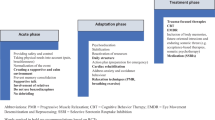Abstract
Background
The role of stressful life events in the onset of Takotsubo cardiomyopathy (TC) is unclear.
Purpose
This study sought to examine associations between type, timing, and number of stressful life events and onset of TC.
Methods
A case-control study conducted among consecutive incident female TC cases and myocardial infarction (MI) controls admitted to two emergency departments in New England. Healthy female controls (HC) were recruited from a volunteers’ registry. Information about the timing, type, and number of triggers during the 6 months preceding hospitalization was systematically collected using the PERI Life Events Scale about 1 month post-discharge. Group differences were evaluated using ANOVA, chi-square, and Kruskal-Wallis statistics. Generalized linear models were used to adjust for confounding variables.
Results
Between March 2013 and October 2015, 107 women were enrolled (45 TC, 32 MI, and 30 HC). Specific stressful events (death of a relative or close friend (p = 0.006); illness or injury to a relative or close friend (p = 0.001) were more prevalent in TC cases than MI and HC controls. The onset of TC was associated with exposure to multiple stressful life events during the 6 months preceding the index hospitalization (p < 0.001) but not with exposure to an acute, recent event (p = 0.96).
Conclusions
TC onset was associated with specific life events (death or illness to close relative or friend) and with the number of stressful life events occurring in the 6 months preceding hospitalization. These findings suggest that grief and cumulative stress could play a major role in the onset of TC.

Similar content being viewed by others
References
Templin C, Ghadri JR, Diekmann J, et al. Clinical features and outcomes of Takotsubo (stress) cardiomyopathy. N Engl J Med. 2015; 373: 929–38.
Dote K, Sato H, Tateishi H, Uchida T, Ishihara M. Myocardial stunning due to simultaneous multivessel coronary spasms: A review of 5 cases. J Cardiol. 1991; 21: 203–214.
Gianni M, Dentali F, Grandi AM, Sumner G, Hiralal R, Lonn E. Apical ballooning syndrome or takotsubo cardiomyopathy: A systematic review. Eur Heart J. 2006; 27(13): 1523–1529.
Pilgrim TM, Wyss TR. Takotsubo cardiomyopathy or transient left ventricular apical ballooning syndrome: A systematic review. Int J Cardiol. 2008; 124: 283–292.
Yerasi C, Koifman E, Weissman G, et al. Impact of triggering event in outcomes of stress-induced (Takotsubo) cardiomyopathy. Eur Heart J Acute Cardiovasc Care. 2016; undefined.
Delmas C, Lairez O, Mulin E, et al. Anxiodepressive disorders and chronic psychological stress are associated with Tako-Tsubo cardiomyopathy–new Physiopathological hypothesis. Circ J. 2013; 77: 175–180.
Wallstrom S, Ulin K, Maatta S, Omerovic E, Ekman I. Impact of long-term stress in Takotsubo syndrome: Experience of patients. Eur J Cardiovasc Nurs. 2015; undefined.
Wittstein IS, Thiemann DR, Lima JA, et al. Neurohumoral features of myocardial stunning due to sudden emotional stress. N Engl J Med. 2005; 352: 539–548.
Salmoirago-Blotcher E, Rosman L, Wittstein IS, et al. Psychiatric history, post-discharge distress, and personality characteristics among incident female cases of takotsubo cardiomyopathy: A case-control study. Heart Lung. 2016; 45: 503–509.
Prasad A, Lerman A, Rihal CS. Apical ballooning syndrome (Tako-Tsubo or stress cardiomyopathy): A mimic of acute myocardial infarction. Am Heart J. 2008; 155: 408–417.
Dohrenwend BS, Krasnoff L, Askenasy AR, Dohrenwend BP. Exemplification of a method for scaling life events: The Peri life events scale. J Health Soc Behav. 1978; 19: 205–229.
American Psychiatric Association. Diagnostic and statistical manual of mental disorders. 5th ed. Washington, DC: American Psychiatric Association; 2013.
Fox E, Cahill S, Zougkou K. Preconscious processing biases predict emotional reactivity to stress. Biol Psychiatry. 2010; 67(4): 371–377.
Ghadri JR, Sarcon A, Diekmann J, et al. Happy heart syndrome: role of positive emotional stress in takotsubo syndrome. Eur Heart J. 2016; undefined.
Buckley T, McKinley S, Tofler G, Bartrop R. Cardiovascular risk in early bereavement: A literature review and proposed mechanisms. Int J Nurs Stud. 2010; 47(2): 229–238.
Lee S, Colditz GA, Berkman LF, Kawachi I. Caregiving and risk of coronary heart disease in U.S. women: a prospective study. Am J Prev Med. 2003; 24(2): 113–119.
Grupe DW, Nitschke JB. Uncertainty and anticipation in anxiety: an integrated neurobiological and psychological perspective. Nat Rev Neurosci. 2013; 14(7): 488–501.
Acknowledgements
We wish to thank Sandhya Reddy, MD (data abstractor) and Ms. Nancy Mecone, BS, RN (research coordinator) for their collaboration on this study.
Author information
Authors and Affiliations
Corresponding author
Ethics declarations
Ethical Approval
All procedures performed in studies involving human participants were in accordance with the ethical standards of the institutional and/or national research committee and with the 1964 Helsinki declaration and its later amendments or comparable ethical standards.
Funding
This work was supported by an American Heart Association (Dallas, TX) award to Dr. Elena Salmoirago-Blotcher (Grant 13CRP1334001). The authors do not have relationships with the industry.
Authors’ Statement of Conflict of Interest and Adherence to Ethical Standards
Authors Lindsey Rosman and Shira Dunsiger declare that they have no conflict of interest. Elena Salmoirago-Blotcher, Md, PhD: this work was supported by American Heart Association (Dallas, TX) award 13CRP1334001 to Dr. Elena Salmoirago-Blotcher. The AHA did not have any role in the design and conduct of the study, in the collection, analysis, and interpretation of the data, and in the preparation, review, or approval of the manuscript. All procedures, including the informed consent process, were conducted in accordance with the ethical standards of the responsible committee on human experimentation (institutional and national) and with the Helsinki Declaration of 1975, as revised in 2000.
Research Involving Human Participants and/or Animals
All procedures performed in studies involving human participants were in accordance with the ethical standards of the institutional and/or national research committee and with the 1964 Helsinki declaration and its later amendments or comparable ethical standards.
Informed Consent
Informed consent was obtained from all individual participants included in the study.
About this article
Cite this article
Rosman, L., Dunsiger, S. & Salmoirago-Blotcher, E. Cumulative Impact of Stressful Life Events on the Development of Takotsubo Cardiomyopathy. ann. behav. med. 51, 925–930 (2017). https://doi.org/10.1007/s12160-017-9908-y
Published:
Issue Date:
DOI: https://doi.org/10.1007/s12160-017-9908-y




